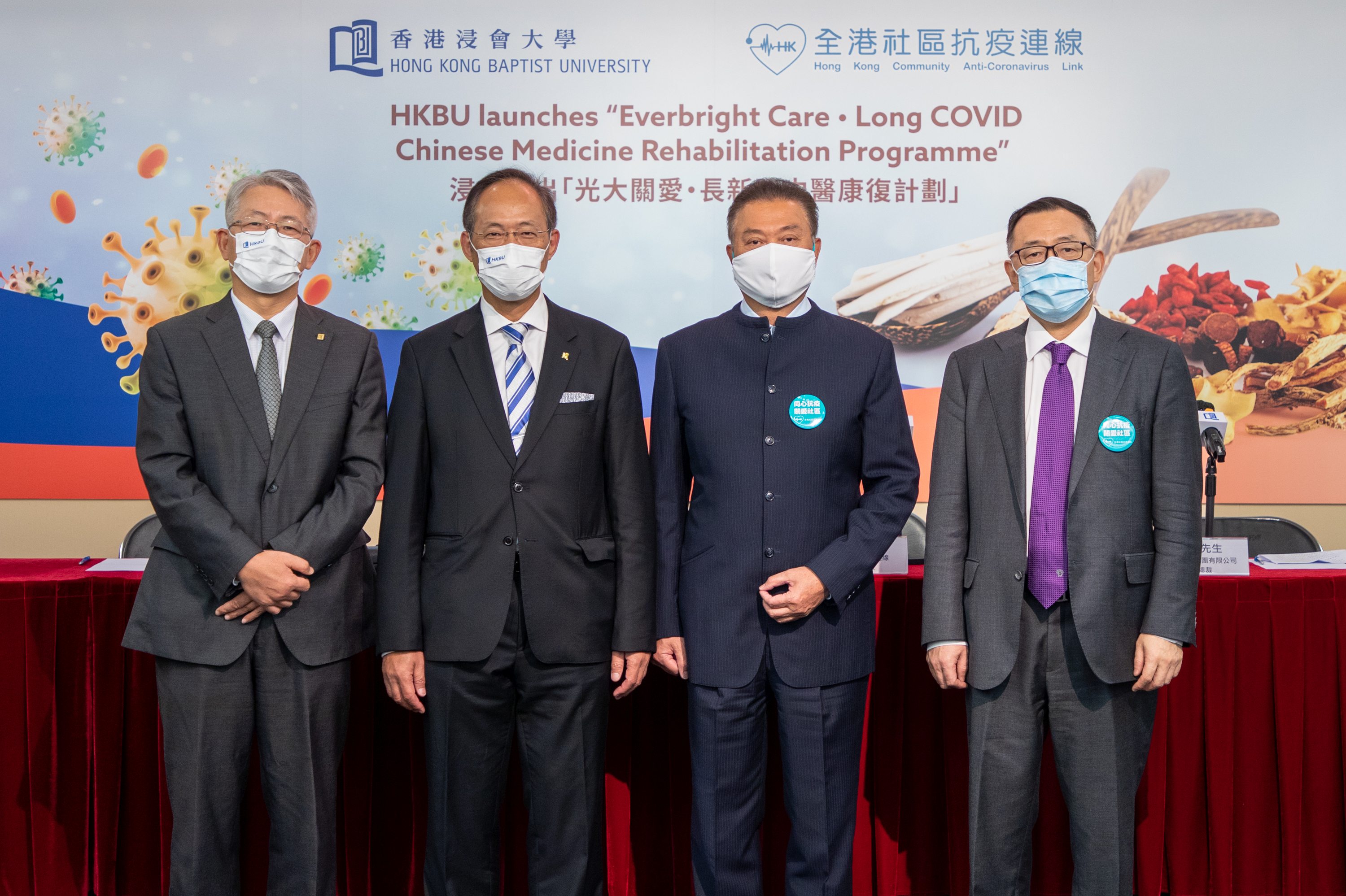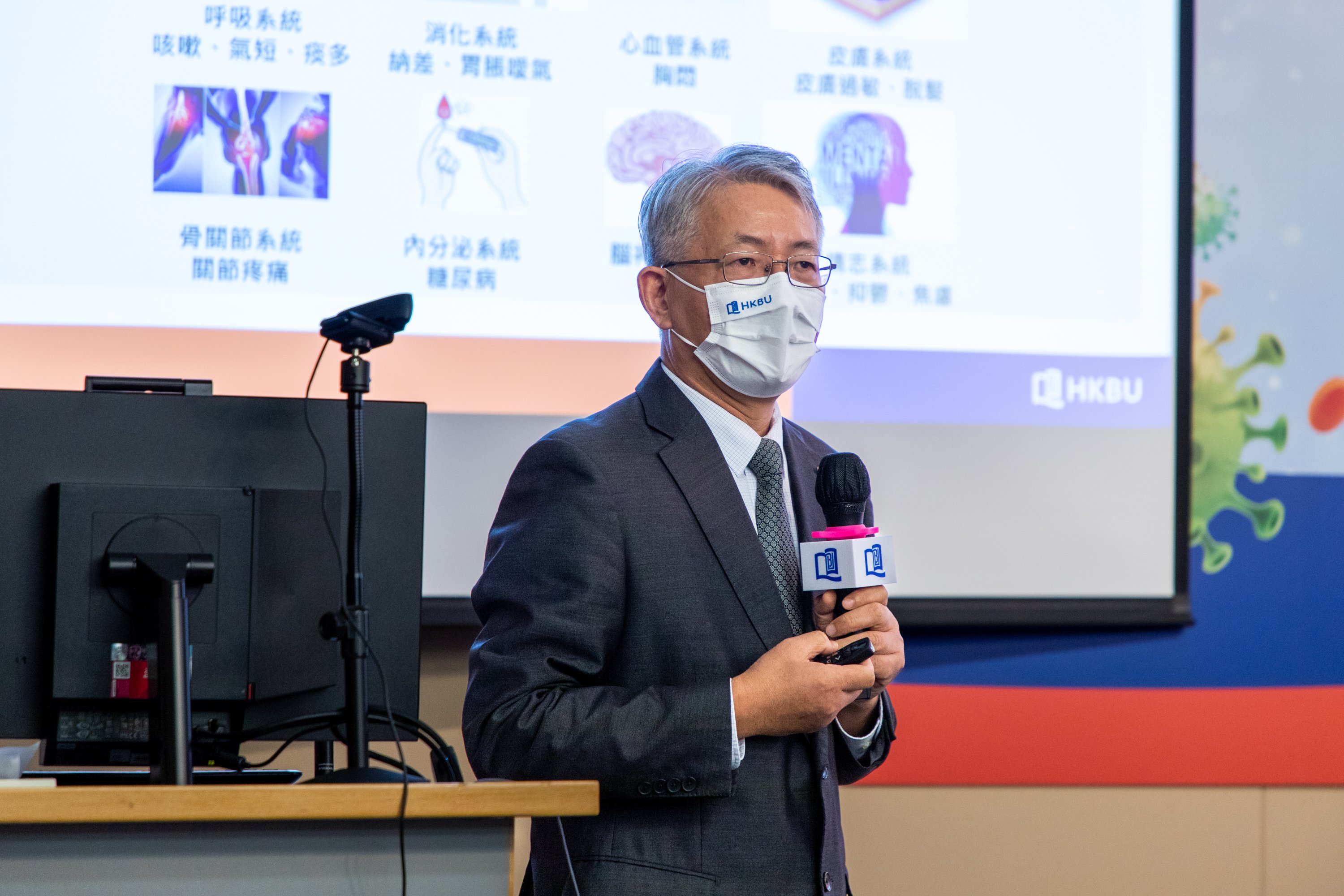Press Release
HKBU launches “Everbright Care • Long COVID Chinese Medicine Rehabilitation Programme”
Wednesday, 7 September 2022
The School of Chinese Medicine at Hong Kong Baptist University (HKBU) has launched the “Everbright Care • Long COVID Chinese Medicine Rehabilitation Programme” to help people who suffer from the after-effects of COVID-19 (commonly known as “long COVID”). Under the programme, HKBU Chinese medicine practitioners will provide a free “long COVID” consultation service and Chinese medicine to people who were hospitalised due to the virus and have since recovered, and recovered elderly people aged 65 or above.
The programme is supported by a funding of HK$5 million from the Hong Kong Community Anti-Coronavirus Link. The funding will be allocated from the donation made by the Hong Kong office of the Everbright Group to the Link designated for the purpose of fighting COVID-19.
Online registration for the programme will begin today (7 September). Based on the clinical symptoms and body constitutions of the participants, HKBU Chinese medicine practitioners will provide up to four sessions of free Chinese medicine consultations. A maximum of six days of Chinese medicine granules will be prescribed for participants in each consultation session, depending on their actual condition.
Professor Alexander Wai, President and Vice-Chancellor of HKBU, said: “The University has been at the forefront of fighting the pandemic by using Chinese medicine for prevention and treatment, and providing holistic care for rehabilitation. Although recent observations suggest that the symptoms of COVID-19 are generally mild, clinical experience shows that many patients have multiple issues after recovery and require prolonged follow-up care. We are grateful for the staunch support of the Hong Kong Community Anti-Coronavirus Link for our sustained efforts in promoting the well-being of the community by launching the ‘Everbright Care • Long COVID Chinese Medicine Rehabilitation Programme’.”
Dr Bunny Chan Chung-bun, Chief Convenor of the Hong Kong Community Anti-Coronavirus Link, said: “The Hong Kong Community Anti-Coronavirus Link promotes the spirit of joining hands to fight against COVID-19 in the community, and it is committed to uniting different sectors of society to combat the disease. As HKBU spares no effort to help society fight against COVID-19, we are supporting the University to launch the ‘Everbright Care • Long COVID Chinese Medicine Rehabilitation Programme’ to offer special care to elderly people and those who have been hospitalised due to the disease, so that more comprehensive and precise support can be provided to people for their COVID-19 rehabilitation.”
Mr Liu Jia, Vice President of China Everbright Holdings Co Ltd, said: “Founded in Hong Kong in 1983, the Everbright Group has long been rooted in the city, and it has heartily contributed to its ongoing development and prosperity. The ‘Everbright Care • Long COVID Chinese Medicine Rehabilitation Programme’ will offer free consultations and medication services to eligible people. We believe this programme will further leverage the positive impacts of Chinese medicine in the fight against the pandemic, and support the Hong Kong community to robustly overcome the challenges of the pandemic.”
Professor Bian Zhaoxiang, Associate Vice-President (Chinese Medicine Development) and Director of the Clinical Division of the School of Chinese Medicine at HKBU, said: “Chinese medicine’s contribution to treating COVID-19 has been recognised by the community, and we have accumulated valuable experience. Many recovered patients have ‘long COVID’ symptoms such as a cough, shortness of breath, insomnia, hair loss, skin irritation, and fatigue. Chinese medicine has rich experience in treating these symptoms effectively. Through this programme, we hope to further strengthen the role of Chinese medicine in the fight against the pandemic, and relieve the issues encountered by recovering patients, thus improving their quality of life.”
Participants of the programme are required to register and make appointments through an online system (https://cmc-booking.hkbu.edu.hk/). For the first and third consultation sessions, eligible participants are required to visit the five designated clinics for face-to-face consultations. The second and fourth consultation sessions will be conducted in the form of video conferencing through a mobile phone communication application. The Chinese medicine prescribed at all consultation sessions should be collected at the designated clinics.
Participants who are aged 65 or above and have recovered from COVID-19 should present one of the following documents at the first consultation session:
· SMS, electronic or paper record of a positive nucleic acid test result provided by private medical testing companies recognised by the Government;
· SMS or electronic record of a successful report submission to the Declaration System of Individuals Tested Positive for COVID-19 Using Rapid Antigen Test under the Department of Health;
· Compulsory quarantine order issued by the Department of Health to the people infected with COVID-19;
· Rehabilitation records issued by the Government or the Hospital Authority; or
· Hospital discharge document.
Recovered patients who were hospitalised due to COVID-19 should present hospital discharge documents at the first consultation session.
Apart from the Programme, the HKBU School of Chinese Medicine established the HKBU Chinese Medicine Team Against COVID-19 and the HKBU Chinese Medicine Telemedicine Centre Against COVID-19 earlier this year to provide free consultations to COVID-19 patients and their close contacts, and the service had more than 41,000 patient visits and distributed more than 170,000 doses of medication. In addition, nearly 100 elderly homes were benefited. From the beginning of the pandemic, the School has distributed more than 100,000 doses of HKBU Chinese Medicine Immunity Enhancement Remedy.
HKBU was also appointed by the Social Welfare Department as one of the operators of the Kai Tak Holding Centre. From March to May this year, the University dispatched a team of Chinese medicine practitioners to provide Chinese medicine-based treatment services to elderly COVID-19 patients with mild symptoms who had been admitted to the Centre.
-End-

